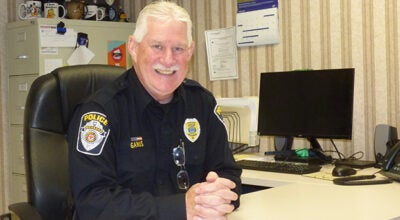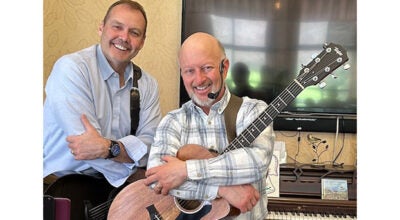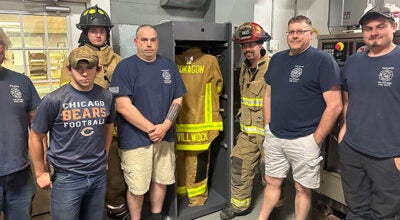Dogwood begins with dedication
Published 7:03 am Tuesday, May 10, 2011

Artist David Baker called Thelda Mathews, chair of the Dogwood Fine Arts Festival Visual Arts Committee, “a magician” for “taking a small community where one might least imagine it’s possible and, by magic, producing this magnificent sculpture collection,” of which Bob Guelich’s Touching Earth II is the 13th. “Even those of us who are close to her and watch very carefully with our mouths agape don’t know how she’s pulled off this trick.” In accepting the anonymous gift on behalf of citizens of the community now and for generations to come, Mayor Lyons said, “Public art brings value to this community and to all communities who engage in it. We all owe a special debt of gratitude to my good friend, Thelda Mathews.” (The Daily News/John Eby)
“Touching Earth II,” the eagle sculpted by Flint native Bob Guelich of San Antonio, Texas, and dedicated at noon Monday by the Dogwood Fine Arts Festival in Burke Park, is an anonymous gift “in memory of the pioneer farmers and their families who helped make the United States great.”
Dr. Jeff Dennis of the Southwestern Michigan College Social Sciences Department said the image of pioneers is self-sufficient, rugged individualists who lived by a “survival of the fittest ethos.”
“But in truth,” Dennis said, “pioneers were communitarians. They had to be to survive. They knew one another. They trusted one another. They cared about one another to an extraordinary degree. I suspect the Dowagiac pioneer community of the 1840s and 1850s would have been very much like an extended family.”
“Community” means other things today, from virtual relationships to online neighborhoods where like-minded people congregate.
“Something else is being lost in the process,” Dennis said. “Community is essential to the development of civility and character. Face-to-face relationships, whether at home or beyond the home, develop deeper commitments and senses of responsibility and accountability. Community is essential to personal and social well-being. It’s very difficult to be a person of character if you’re not a person of community. In fact, it’s irrelevant.”
Thinking of American pioneer communities in the second quarter of the 19th century brings to mind a place 20 miles northwest of Springfield, Ill., the small village of New Salem where “our greatest” President Abraham Lincoln, “the quintessential American,” lived for six years as a young adult.
In addition to Lincoln’s “exceptional intellect,” “great gift for words,” sense of humor and personal ambition, “The people who knew Lincoln best most appreciated his compassion and empathy for others. Even people all across the country knew him as Honest Abe, a person of integrity and character. To know the Lincoln of the White House in the 1860s, we have to look back to the Lincoln, the pioneer settler of New Salem of the 1830s. It was in that community, that extended family, that Lincoln received much of his training in civility.”
“Turning the arrow of time in the other direction” to 2100, Dennis said, “What kind of community do we see here in Dowagiac? What kind of nation do we see? I’m not that concerned about terrorism today. I’m not that concerned about economic depression. I’m not even that concerned about global warming or some viral pandemic. I’m certainly not concerned about some meteorite taking out Dowagiac. I’m not so concerned about what’s going to happen to us as what’s going to happen within us and between us.”
U.S. history “shows us that if we are a people of compassion, of community, of character and commitment, we can weather whatever the future may bring,” Dennis said.
Tom Brokaw wrote that the Great Depression and World War II produced “The Greatest Generation,” which emerged stronger for being tested.
“History also tells us,” Dennis said, “that nations have not stood the test of time because they somehow lost their sense of community.
“Pioneers have to plan, to build and to sacrifice even for generations yet unborn. We’re here this afternoon because of the pioneering efforts of a group settlers of the 1840s and ’50s. In a sense, we’re pioneers, too. We need to plan, we need to build and we need to sacrifice for the future of our community and our nation.”






